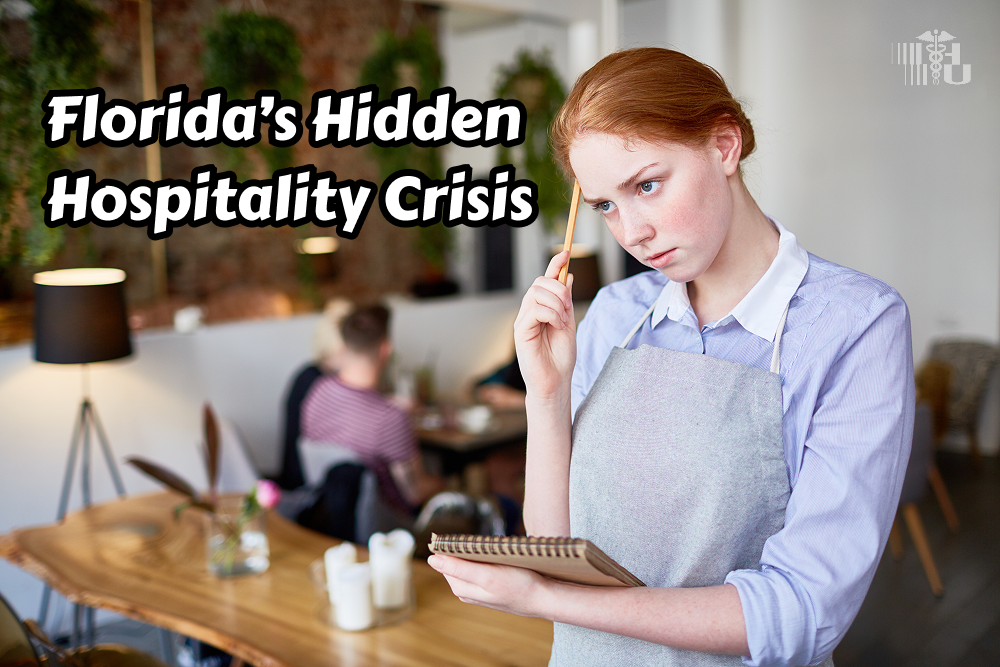Florida’s tourism industry is the engine of its economy, drawing millions to its beaches, theme parks, and vibrant cities yearly. But beneath the surface of this perpetual vacation destination, hospitality workers grapple with relentless demands that can take a profound toll on their behavioral and mental health. The stress, anxiety, and depression experienced by those in Florida’s hospitality sector are often invisible to tourists but are as accurate and impactful as any hurricane that sweeps the state.
Tourism forms a crucial pillar of Florida’s economy. The Tourist Development Tax (TDT), funded by visitors rather than residents, is vital in fueling destination marketing efforts that attract more tourists. This influx generates jobs, supports local businesses, and underpins essential public services. Removing TDT funding for its intended purpose would severely undermine Florida’s ability to compete for tourists, leading to significant long-term financial challenges.
Stress Behind the Smiles
Hospitality workers in Florida- whether at Orlando’s theme parks, Miami’s hotels, or coastal restaurants- are expected to deliver impeccable service with a constant smile, regardless of their emotional state. This requirement to project positivity, even during personal hardships or exhaustion, is a significant source of stress. Many workers report feeling “constantly switched on and on edge,” with little time between shifts to decompress or rest adequately. The industry’s long hours and unpredictable schedules make it difficult for employees to maintain a healthy work/life balance or achieve the recommended amount of sleep.
The cumulative effect of these pressures is not just emotional fatigue. Chronic stress is a significant risk factor for a range of health issues, particularly Behavioral health disorders like anxiety and depression. Over time, the need to consistently meet or exceed guest expectations can erode even the most resilient worker’s well-being.
Behavioral Health: Beyond the Surface
Behavioral health is how our habits, actions, and environments influence our mental and physical health. In Florida’s hospitality industry, behavioral health is shaped by:
- Irregular hours and shift work disrupt sleep and family life.
- High guest volume and demanding workloads, especially during peak tourist seasons.
- Job insecurity and low wages add financial stress to daily pressures.
- Limited opportunities for advancement lead to feelings of stagnation or hopelessness.
These factors can drive unhealthy coping mechanisms, such as substance use, poor diet, or social withdrawal, that further compound psychological health challenges.
Anxiety and Depression: The Unseen Epidemics
Anxiety and depression are two of the most common mental health issues among hospitality workers. The constant need to anticipate and respond to guests’ needs, handle complaints, and manage unpredictable situations keeps workers in heightened alert, fueling anxiety. Over time, this “always on” mentality can lead to emotional exhaustion and depression, marked by feelings of sadness, hopelessness, and disconnection.
Research shows that the pressure to always be “on” and to fulfill expected roles in tourism can adversely affect workers’ mental health. The expectation to be “novel” or “authentic” for guests adds another layer of psychological strain, often leading to isolation and a sense of otherness.
Barriers to Seeking Help
Despite the clear need, accessing mental health support in Florida remains a significant challenge. The state’s mental health system is often fragmented, with a shortage of psychiatrists, psychologists, and therapists, and limited evidence-based behavioral health services. Even when services are available, the cost can be prohibitive- therapy sessions for anxiety or depression can cost up to $200 each, and many hospitality workers lack adequate insurance coverage.
Stigma is another significant barrier. Many workers feel that their employers would not understand if they needed time off for psychological health reasons, and the culture of “leaving your problems at the door” discourages people from seeking help. In surveys, only about half of hospitality workers who reported psychological health difficulties had sought help, and a staggering 90% agreed that there was a stigma surrounding mental health in the industry.
The Role of Psychiatrists, Psychologists, and Therapists
Mental health professionals are critical in supporting hospitality workers.
- Psychiatrists can diagnose and treat mental health disorders, prescribe medication, and manage complex cases.
- Psychologists provide assessment, therapy, and coping strategies for stress, anxiety, and depression.
- Therapists (including counselors and social workers) offer support, guidance, and practical tools for managing daily stressors.
Access to these professionals is vital, but systemic investment in behavioral and mental health infrastructure is urgently needed, with demand outpacing supply.
Therapy and Self-Care: Managing Stress in the Sunshine State
Therapy is vital for managing Florida’s unique stressors, from hurricane anxiety to the relentless pace of tourist season. Professional support helps hospitality workers:
- Recognize and address signs of burnout, anxiety, and depression.
- Develop healthy coping strategies like mindfulness, exercise, and time management.
- Build resilience to handle the emotional demands of their roles.
- Reframe negative thought patterns and set boundaries between work and personal life.
Employers also play a crucial role. Providing Employee Assistance Programs (EAPs), flexible scheduling, mental health days, and access to digital wellness tools like Headspace or BetterHelp can make a significant difference.
A Call to Action: Prioritizing Behavioral Health in Hospitality
Florida’s tourism industry cannot thrive at the expense of its workers’ well-being. Addressing the behavioral and mental health needs of hospitality employees requires:
- Increased funding and staffing for mental health services statewide.
- Workplace policies that prioritize mental health, such as regular check-ins and access to counseling.
- Public awareness campaigns to destigmatize behavioral health issues and encourage seeking help.
- Training for managers to recognize signs of stress and mental health crises among staff.
Florida’s hospitality workers are the unsung heroes who ensure that millions of visitors experience the magic of the Sunshine State. Yet, the high-paced, high-pressure environment in which they operate exacts a heavy toll on their behavioral and mental health. By acknowledging the unique stressors they face and investing in accessible, affordable mental health care, including the support of psychiatrists, psychologists, and therapists, Florida can create a tourism industry that is not only world-class for visitors but also a healthy, sustainable workplace for those who make it possible.
Harmony United Psychiatric Care, Florida, provides essential care with our professional and board-certified team of Psychiatrists, Psychologists, and Therapists. You obtain a secure and customized treatment for your mental health issues, including eating disorders, PTSD, bipolar disorders, stress, anxiety, depression, and OCD.
For more information about mental health conditions, visit our Mental Health Library page. To understand and cope with your major depressive disorder symptoms, get help from our top psychiatrists, psychologists, and therapists, who are known for providing the best mental health treatment, medication management, and psychiatry services. To book an appointment, please call us at (800) 457-4573 or submit an appointment request.



Leave a Reply